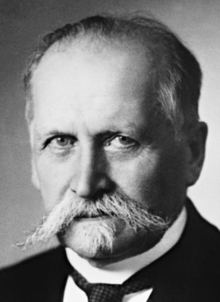Kyösti Kallio
|
President Kyösti Kallio |
|
|---|---|
 |
|
| 4th President of Finland | |
|
In office 1 March 1937 – 19 December 1940 |
|
| Prime Minister |
A. K. Cajander Risto Ryti |
| Preceded by | P. E. Svinhufvud |
| Succeeded by | Risto Ryti |
| Prime Minister of Finland | |
|
In office 7 October 1936 – 15 February 1937 |
|
| President | P. E. Svinhufvud |
| Preceded by | T. M. Kivimäki |
| Succeeded by | A. K. Cajander |
|
In office 16 August 1929 – 4 July 1930 |
|
| President | Lauri Kristian Relander |
| Preceded by | Oskari Mantere |
| Succeeded by | P. E. Svinhufvud |
|
In office 31 December 1925 – 13 December 1926 |
|
| President | Lauri Kristian Relander |
| Preceded by | Antti Tulenheimo |
| Succeeded by | Väinö Tanner |
|
In office 14 November 1922 – 18 January 1924 |
|
| President | K. J. Ståhlberg |
| Preceded by | A. K. Cajander |
| Succeeded by | A. K. Cajander |
| Personal details | |
| Born |
10 April 1873 Ylivieska, Finland |
| Died | 19 December 1940 (aged 67) Helsinki, Finland |
| Nationality | Finnish |
| Political party | Agrarian League |
| Spouse(s) | Kaisa Nivala |
| Children | Vieno, Veikko, Kerttu, Kalervo, Kaino and Katri |
| Occupation | Farmer, bank clerk |
| Religion | Lutheranism |
| Signature | |
Kyösti Kallio (Finnish pronunciation: [kyøsti kɑlːio]; 10 April 1873 – 19 December 1940) was the fourth President of Finland (1937–1940). He was a prominent leader of the Agrarian League, and served as Prime Minister four times and Speaker of the Parliament six times.
Kyösti Kallio, originally Gustaf Kalliokangas (forename's Swedish pronunciation: [ˈɡʉstɑːv], surname's Finnish pronunciation: [kɑlːiokɑŋːɑs]) was born in Ylivieska, Finland. His father was a farmer and a prominent local politician.
Kallio served in the Diet of Finland 1904–1906 as a member of the Estate of the Peasantry. He joined the newly founded Agrarian Union (a farmers' party) in 1906 and became one of its prominent leaders. He became an Agrarian minister in the Senates of Oskari Tokoi, Pehr Evind Svinhufvud and Juho Kusti Paasikivi.
During the Civil War in Finland, Kallio hid in Red-dominated Helsinki, because he was at least nominally on the White side and therefore a "class enemy"; he formed a new senate (government) in Helsinki after German troops had defeated the Reds in the city. Afterwards he became a moderate peace-maker and disapproved of retaliation against the Reds.
...
Wikipedia
